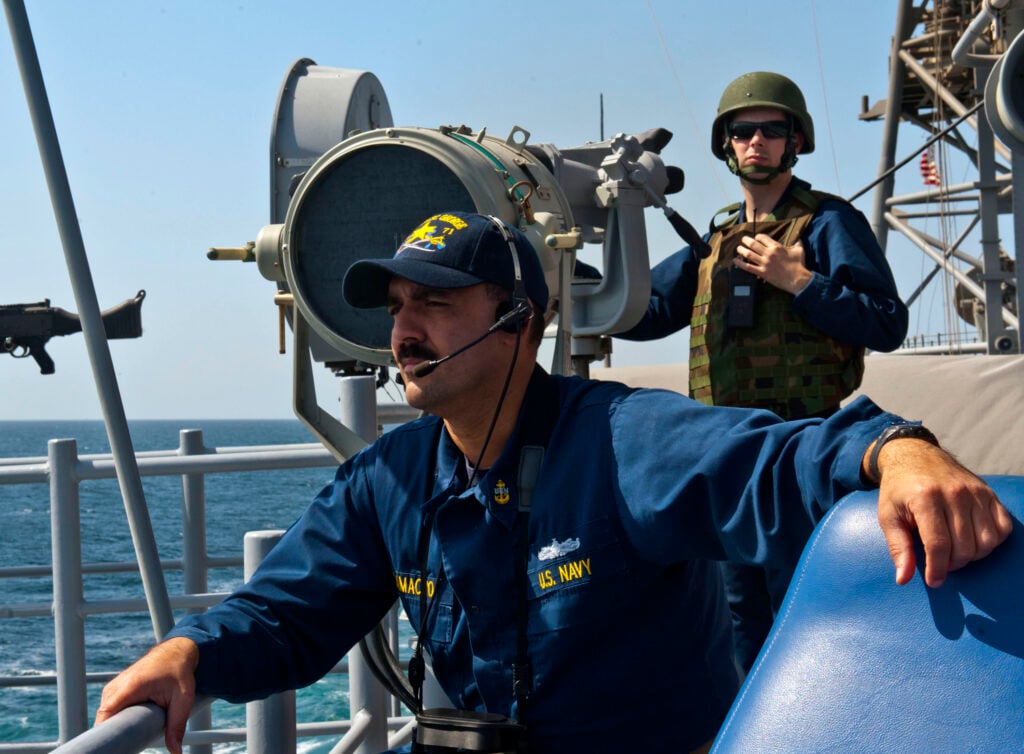‘I Go Where I Please:’ Unshackle Navy To Reply To Iran
Posted on

US Navy sailors watch for Iranian ships in Strait of Hormuz
One of America’s first naval heroes, Commodore Stephen Decatur, was challenged by an Algerian admiral in 1815. Decatur’s reply is now enshrined in international law for ships sailing the seven seas: “I go where I please.” This ethos came to define the mission of the U.S. Navy – ensuring the high seas are free and safe for all legitimate shipping.
But just as the Barbary pirates of yore impeded safe passage, U.S. vessels today are challenged by new aggressors, Iran foremost. Iranian forces or their proxies have forcibly tried to prevent the U.S. Navy from sailing freely in international waters in the Persian Gulf and, more recently, in the Red Sea,.

Kirkland Donald
The U.S. response to this disturbing pattern of sea-borne belligerence, until recently, has been muted. This only invites ever more dangerous behavior from Iran. It is time for the United States to revive Decatur’s intent and allow the Navy to assert our right to go “where we please” within the boundaries of international laws and norms of behavior.
The trouble started shortly after the negotiation, in July 2015, of an agreement meant to curtail Iran’s nuclear program, known as the Joint Comprehensive Plan of Action (JCPOA). On the day after Christmas last year, an Iranian ship fired multiple unguided rockets in the vicinity of the aircraft carrier USS Truman. Shortly thereafter, Iran seized two U.S. Navy riverine craft, holding their 10 sailors hostage at gunpoint. Since then, Iranian vessels have “swarmed,” fired at, or come dangerously close to colliding with U.S. ships some 30 times.
The trouble is not limited to the Persian Gulf. Iranian-armed Houthi rebels in Yemen fired cruise missiles at the guided missile destroyer USS Mason in the Red Sea.

John Bird
Perhaps foreseeing that the JCPOA would embolden Iran, the commander of the Fifth Fleet, Vice Adm. John Miller, clarified to his forces in July 2015 that they did not have to “absorb the first round” before engaging aggressive vessels. Despite these bold orders, caution seems to be the watchword of the Obama Administration’s underlying policy toward Iran’s aggressive behavior. Repeatedly, U.S. ships have allowed Iranian vessels to close to unsafe distances or fire at them, responding only with radio calls, flares, and the occasional warning shot — if at all. Just recently, the United States responded to the Houthis by targeting the radar batteries from which the launches originated. But even this was several days after the fact.
While such restraint might appear prudent, in fact it only emboldens all aggressors toward more reckless behavior, establishes a dangerous precedent of unresponsiveness and undermines U.S. credibility.
First, like the frog boiled to death in incrementally heated water, such repeated incidents inure us to risk. The more often Iran endangers our sailors and ships, the more numbed we become tactically and operationally. The more aggression we are willing to tolerate as part of a “new normal,” the more accepting we become of Iranian boats operating within hundreds of feet of our capital ships. The easier it becomes for Iran to cross from harassment to hostility, with disastrous consequences.
Second, our lack of reaction – starting with the commander-in-chief – sets a precedent that other countries are watching. These incidents, and their increasing frequency, have the potential to create crises of confidence among our allies globally, and raises the possibility of unpredictable escalation by our adversaries. The more aggressive we allow Iran to be, the more aggressive Russia, China, North Korea, and other would-be challengers of U.S. global preeminence will become. It is no coincidence that China is now trying to muscle U.S. ships out of the South China Sea by militarizing reefs and declaring a new zone of control.
Third, Iran’s ability to harass U.S. ships with impunity undermines the credibility of the United States, its commitment to maintain safe and secure sea lanes of communication, and the Navy’s ability to execute that mission. We act as the “neighborhood beat cop” upholding law and order on the open seas because our economy depends upon the ability of goods – oil, food, cars, electronics – to be shipped freely and safely from one corner of the globe to another. But if our Navy’s heavily armed ships can no longer sail in international waters without being harassed, the impact on commercial shipping and, by extension, the global economy could be disastrous.
It is time for the United States to revive the spirit of Commodore Decatur. The Navy’s rules of engagement should be unshackled to once again allow captains to sail assertively, affirm our legal rights of unhindered passage under international law, and demonstrate clearly to Iran the dangers of its aggressive behavior on the open seas. U.S. ships should go where they please.
Retired Adm. Kirkland Donald is former director of the Naval Nuclear Propulsion Program. Retired Vice Adm. John Bird is former commander of the 7th Fleet. Both are members of the Board of Advisors of the Jewish Institute for National Security of America (JINSA).
Subscribe to our newsletter
Promotions, new products and sales. Directly to your inbox.
